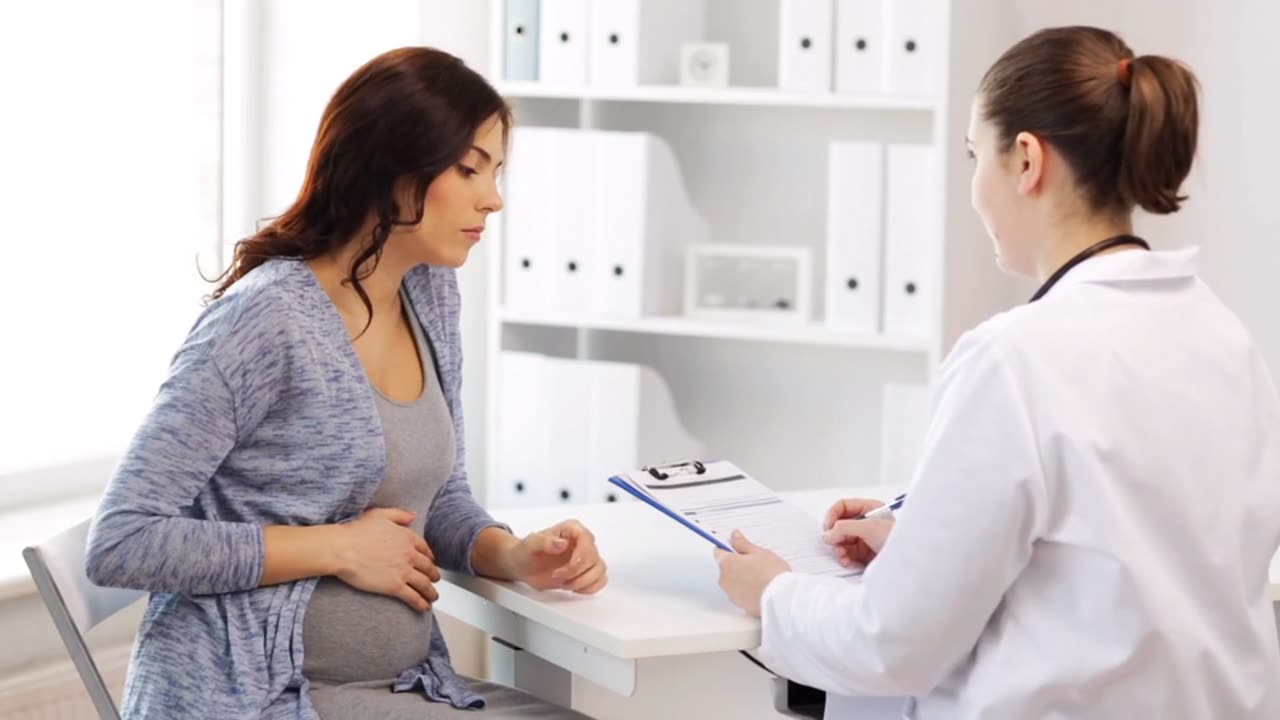Premium Only Content

Increased Risk of Severe Illness
Increased Risk of Severe Illness
close up of pregnant person belly
If you are pregnant or were recently pregnant, you are more likely to get severely ill from COVID-19 compared to people who are not pregnant. Pregnancy causes changes in the body that could make it easier to get very sick from respiratory viruses like the one that causes COVID-19. These changes in the body can continue after pregnancy.
Severe illness means that a person with COVID-19 may need:
Hospitalization
Admission into an intensive care unit (ICU)
A ventilator or special equipment to help them breathe
People with COVID-19 who become severely ill can die. See why pregnancy is included in the list of underlying medical conditions that increase a person’s risk of severe illness from
Certain factors can increase risk
Other factors can further increase the risk for getting very sick from COVID-19 during or recently after pregnancy, such as:
Having certain underlying medical conditions
Being age 25 years or older
Living or working in a community with high numbers of COVID-19 cases
Living or working in a community with low levels of COVID-19 vaccination
Working in places where it is difficult or not possible to avoid contact with people who might be sick with COVID-19
Being part of some racial and ethnic minority groups, which have been put at increased risk of getting sick from COVID-19 because of the health inequities they face
Effect on Pregnancy Outcomes
People with COVID-19 during pregnancy are more likely to experience complications that can affect their pregnancy and developing baby compared to people without COVID-19 during pregnancy. For example, COVID-19 during pregnancy increases the risk of delivering a preterm (earlier than 37 weeks) or stillborn infant. People with COVID-19 during pregnancy may also be more likely to have other pregnancy complications.
Staying Healthy During and After Your Pregnancy
Keep all of your healthcare appointments during and after pregnancy. Visit with your healthcare provider for all recommended appointments. If you’re concerned about going to your appointments in person because of COVID-19, ask your healthcare professional what steps they are taking to protect patients from COVID-19, or ask about telemedicine options. If you need help finding a healthcare professional, contact your nearest hospital, clinic, community health center, or health department.
Talk to your healthcare professional about how to stay healthy and take care of yourself and the baby.
Ask any questions you have about the best place to deliver your baby. Delivering a baby is always safest under the care of trained healthcare professionals.
You should also talk to your healthcare professional if you think you are experiencing depression during or after pregnancy.
Get recommended vaccines during pregnancy. These vaccines can help protect you and your baby.
Get a flu vaccine every year. Others living in your household should also get vaccinated to protect themselves and you.
Get the Tdap vaccine to protect your baby against whooping cough, which can have similar symptoms to COVID-19. CDC recommends all pregnant people receive a Tdap vaccine during each pregnancy. In addition, everyone who is around the baby should be up to date with their whooping cough vaccine.
Call your healthcare professional if you have any concerns about your pregnancy, if you get sick, or if you think that you may have COVID-19.
Do not delay getting emergency care because of worries about getting COVID-19. Emergency departments have steps in place to protect you from getting COVID-19 if you need medical care.
If you need emergency help, call 911 right away. If someone else is driving you to the emergency department, call the emergency facility while you are on the way. If you must drive yourself, call before you start driving.
Tell them that you are pregnant or were recently pregnant and are having an emergency.
Seek medical care immediately if you experience any urgent maternal warning signs and symptoms (for example, headache that won’t go away, dizziness, fever, severe swelling of hand, face, arm or leg, trouble breathing, chest pain or fast-beating heart, severe nausea and throwing up, or vaginal bleeding or discharge during or after pregnancy). These symptoms could indicate a potentially life-threatening complication.
-
 59:16
59:16
CarlCrusher
10 hours agoAncient Psionic UFO Contact in Skinwalker Territory with Vetted & WHY Files - Ep 3
166 -
 25:17
25:17
Esports Awards
16 hours agoFrom Gamer to CEO: Cherrygumms’ Journey in Esports | Origins Podcast #29
191 -
 20:08
20:08
Professor Gerdes Explains 🇺🇦
15 hours agoThe Polish Drone Strike was a Russian PSYOP
17 -
 5:57
5:57
Breaking Points
17 hours agoJudge DROPS Terrorism Charge Against Luigi
594 -
 2:17:45
2:17:45
Side Scrollers Podcast
19 hours agoDestiny & Hasan in “Deep Trouble” + Legal Mindset on Charlie Kirk Firings + More | Side Scrollers
3.82K16 -
 55:35
55:35
Dialogue works
23 hours ago $0.25 earnedJohn Helmer: The Moves Russia Is Making to OUTMANEUVER NATO
3.11K7 -
 36:25
36:25
Actual Justice Warrior
1 day agoAna RAGES At Destiny
24.3K20 -
 28:35
28:35
itsSeanDaniel
2 days ago"BBC is Lying" - British Patriot REVEALS THE TRUTH about Historic London Rally
13K20 -
 26:13
26:13
The Brett Cooper Show
2 days ago $4.45 earnedThe Dark Truth Behind Child Acting | Episode 65
74.7K21 -
 27:09
27:09
Liberty Hangout
9 days agoFooling Libs to AGREE Biden's Cages Were Worse
182K35